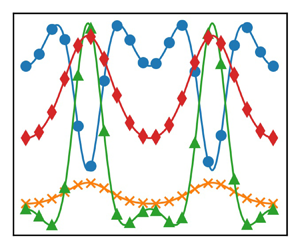No CrossRef data available.
Published online by Cambridge University Press: 16 January 2023

This paper is dedicated to the development of particle charge and velocity second-order moment transport equations for monodisperse particles in gas flow with a tribocharging effect. The full transport equations for the particle charge–velocity covariance and the charge variance are derived in the framework of the kinetic theory of granular flow assuming that the electrostatic interaction does not modify the collision dynamics. The collision integrals are solved without presuming the form of the electric part for the particle probability density function. The full second-order transport equation model is tested in a one-dimensional periodic domain. The results show that this model is able to capture more important physical mechanisms that are neglected by simple algebraic models proposed in the past. An in-depth analysis of the transport equations is also performed. This study reveals that, for sufficiently small covariance characteristic destruction time scales, the transient and third-order moments terms can be safely neglected. In addition, two different reduced-order models are proposed: a more general algebraic model that takes into account the variance effect and a semi-algebraic model that only resolves a transport equation for the charge variance coupled with an algebraic model for the covariance. The former could, however, lead to non-physical predictions in many cases, while the latter can be a suitable alternative only for a sufficiently small interparticle collision time. Finally, a simple chart based on test case simulations is proposed to show under which conditions a semi-algebraic model could be considered as a suitable alternative.